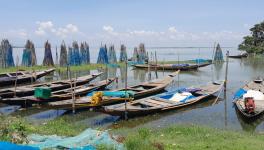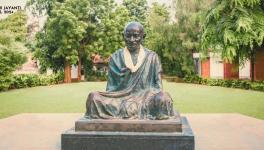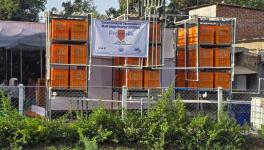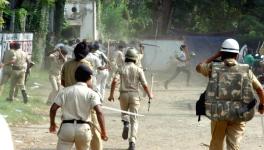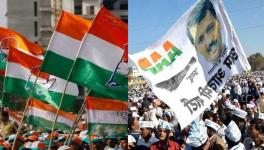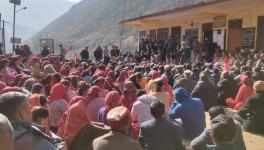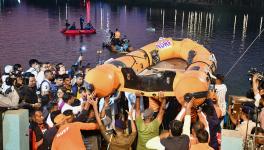Villagers Protest to Save Land and Livelihood as Gujarat Govt Set to Build Port in Valsad
Representational use only.Image Courtesy: The Indian Express
Residents of Nargol, a coastal village in Umargam taluka of Valsad, Gujarat, have once again erupted in protest against an upcoming port in their village. The Gujarat government recently gave a nod to the Gujarat Maritime Board (GMB) to float global bids to build a multi-functional port at Nargol, which the villagers say will snatch their land and destroy livelihoods.
The upcoming port at Nargol is expected to be the alternative to Jawaharlal Nehru Port or JNPT in Mumbai that is almost running in full capacity. The Vijay Rupani government gave the nod to Gujarat Maritime Board (GMB) to float global bids to build a multi-functional port at a cost of Rs 3,800 crore that will be capable of handling solid, liquid and container cargo.
As per a statement issued by the Gujarat government on June 24 this year, the Jawaharlal Nehru Port near Mumbai is expected to reach its optimal operational capacity by the year 2025, and therefore, a greenfield port in South Gujarat can help serve industries in Gujarat, Maharashtra and Madhya Pradesh.
The Gujarat government has been planning to develop a port in Valsad since 1997. The present location identified for building the port is at Nargol village, about 140 kilometres from Mumbai and 120 kilometres from Surat.
Locals claim that the land chosen for the port is around the village and it contains fertile marine life and fruit orchards, which are the primary source of their livelihood. In June, the 14-member Nargol Gram Panchayat held a general board meeting and passed a resolution opposing the development of the port.
“Nargol has a population of about 16,000 and about half of the population depends on fishing as their primary source of livelihood. The fishermen fear that the coastal line, which is a breeding ground for fish like Surmai, prawns, Bombay duck, lobsters, pomfrets, will be affected once a port is built in the area. The area has rich maritime life and fish from this area is exported to several countries for a good price. The land that will also be acquired for transportation of cargo belong to villagers and tribals of the area who are dependent on agriculture for livelihood. We grow mangoes, chiku, berries and other vegetables and crops here. Besides, Nargol isn’t the only village that will be affected by the upcoming port. Apart from the coastal line of four kilometres in Nargol, the port is expected to extend into neighbouring villages like Umargam, Tadgam, Saronda, Maroli, Fansa, Kalai etc,” Yatin Bhandari, former panchayat head of Nargol, told the Newsclick.
“The government of Gujarat one day announced that it had decided to build a port here again. No authority has approached us or the gram panchayats, sought our opinion or informed us about the details of the project. We are yet to be told if there will be any rehabilitation after our land is acquired. We are not against development but it should not come at the cost of our livelihood,” added Bhandari who is a farmer by profession.
The locals of Umargam taluka in South Gujarat have been protesting against the upcoming port since the project was announced in 1997. After the announcement, the port was planned to come up at Maroli, a coastal village about 10 kilometres from Nargol in Umargam taluka. The then Keshubhai Patel-led government had issued the letter of intent (LoI) to the Natelco-Unocal consortium for the project. Following which, in 1999, the villagers erupted in protest against the project under the banner of Kinara Bachao Samiti and the Umbergaon Taluka Bandar Hatao Sangharsh Samiti.
“Earlier, when the project was announced for the first time, both fishermen and farmers of the area had come together to protest against the port. The reason for protesting remains same as it was in 1997 -- the affect that the port will have on the maritime fauna and the fertile land around the coast. After strong resistance from locals for years, the government of Gujarat decided to shift the location of the project from Maroli to Nargol,” Krishnakant Chauhan, a Surat-based environmental activist, told the Newsclick. He added, “Between 2012 to 2014, bids were floated again for the project and the LOI was given to Cargo Motors Pvt Ltd and Amarillis, the international arm of Israel Ports Company (IPC). However, locals of several villages around the port resumed protest again. Subsequently, a public hearing was organised for the project and huge number of villagers had participated in it to express their concern. Eventually, both the companies backed out of the project. Last month, the Gujarat government announced to commence the project again.”
Noticeably, the protests were led by retired Lt Col Pratap Save, a resident of Nargol and president of the Kinara Bachao Samiti. On April 7, 2000, at the peak of the protests against the proposed port, more than 40 protesters including women were arrested by the state police. Save, who was arrested with the villagers, was brutally thrashed till he lost consciousness and was shifted to a hospital in Vapi, Gujarat. Later, he was shifted to a hospital in Mumbai where he succumbed to the injuries on April 20, 2000. His wife, Sunita Save had filed a case against then Deputy Superintendent NK Amin (also accused in Shohrabuddin encounter case) and a constable for the custodial death.
“One night, the police encircled Nargol and picked up the men of the village. When Pratap Save got to know about it, he followed the detained men to the police station. However, police detained him too and thrashed him in a separate cell. After he was allowed in the same cell as others, the villagers reported that Save was unable to stand. The detained villagers raised hue and cry and Save was hospitalised. Later he was shifted to Mumbai where he succumbed to his injuries. The protests had intensified following his death,” said Chauhan.
Interestingly, the port is not only project that the Gujarat government is planning to build in South Gujarat. The bullet train project and a dedicated freight corridor are also slated to come up in the same area for which massive stretches of land have been acquired in districts between Mumbai and Surat amid protests by land owners.
Get the latest reports & analysis with people's perspective on Protests, movements & deep analytical videos, discussions of the current affairs in your Telegram app. Subscribe to NewsClick's Telegram channel & get Real-Time updates on stories, as they get published on our website.









